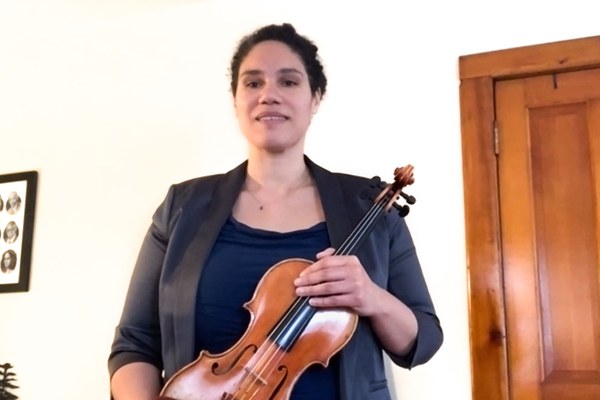Jessie Montgomery, graduate fellow in Music Composition at Princeton University, was our early-career musician in fall 2020. Her research report gave a glimpse into preparations for her forthcoming opera based on personal family history and the history of Buffalo Soldiers.
Q&A with Jessie Montgomery
Who were the Buffalo Soldiers?
The Buffalo Soldiers were the members of the all-Black 10th Cavalry Regiment of the US Army from the latter half of the nineteenth century to the early part of the twentieth century. One of the regiment’s main purposes was to fight against the Native Americans; the name “Buffalo Soldier” is said to come from Native American descriptions of the soldiers’ woolly hair. The regiment was active during the Spanish-American War, playing a significant role at the Battle of San Juan Hill in Cuba when they were sent to the front line. The Buffalo Soldiers represent an interesting relationship between two major oppressed groups in the United States, fighting against each other for freedom in this country—joining the army was one of many difficult choices Black people made to survive in America, and one that significantly benefited the country and the groups in power, but our history and records still haven’t honored that legacy. My great-great-grandfather, Sergeant William McCauley, was a Buffalo Soldier, and I am working on a suite and opera around his story, which will hopefully bring the history of Buffalo Soldiers to light for more people.
How has your project for telling Sergeant McCauley’s story developed?
I wrote a nonet for strings and winds called Sergeant McCauley, where I incorporated different spirituals said to have originated in parts of the United States he might have traveled through during his migration and military service. They appear in the first, third, fourth, and fifth movements, charting the geographical route Sergeant McCauley may have taken.
I’m working on a second suite for the National Symphony Orchestra, which is similar to music appearing in the Sergeant McCauley opera as part of the New Works Program at the Metropolitan Opera and Lincoln Center. There is a tradition of creating suites of dances or songs from a larger theatrical work, either in development for the larger work or after the big work is already completed. In this case, I’m writing this second suite to prepare for writing the opera next year, so I’m structuring the movements around theatrical scenes and images that might take place in the opera. For example, McCauley was a wagoner, so there’s a tune that stages wagoners moving through their barracks. Another movement is an aria sung by his wife, Pencie McCauley; another movement is a battle or war scene, true to the dramatic operatic form.
Why is it important to tell this story as an opera?
Opera hasn’t depicted the full breadth of Black stories—there is just not a lot of Black representation in the repertoire yet. I want to continue the tradition of telling Black American stories as American stories, as a shared experience and history. This is the story of a man who was in the army and had a family, and all sorts of beauty that came from that—his first cousin was Rosa Louise McCauley Parks. Telling his story as an opera is an opportunity to tell this personal and broader history on the largest musical platform imaginable. I hope it will have an impact on our collective consciousness and conscience about what our history means to us and for us.
It’s been a weird year, but there are plans for me to present my music live when we can. [Artistic Director of Music] Valerie Stains has been great during my time at Dumbarton Oaks—she’s been my ears for all my research ideas and having her here to talk through what I want and where I want my piece to go has been extremely helpful. I’ve also loved the opportunity to dive into this subject even more. It’s not often I have all this information and these resources before I write a single note, so it’s been a different process—I’m learning a lot about my family history, which is very powerful and important in the long run to make sure the storytelling is accurate.
May Wang is postgraduate writing and reporting fellow at Dumbarton Oaks. Photo by Richard Tong, postgraduate digital media fellow.

